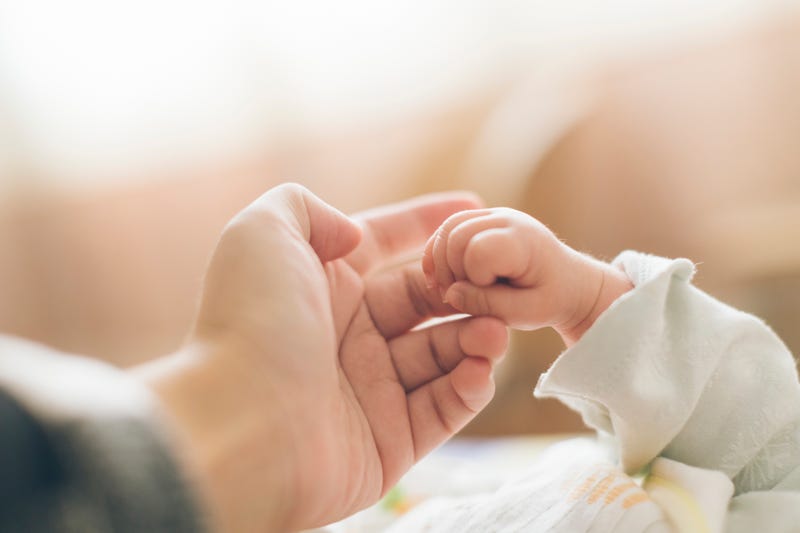
When Amy Yamaguchi of Seal Beach, Calif., held her daughter for the first time this summer, the baby was already five months old, said Cedars-Sinai Medical Center.
From the time Yamaguchi was diagnosed with COVID-19 in December to this first meeting, she had been in a coma, had a lung transplant and a had a series of mini-strokes. Upon waking up from her surgery, she didn’t remember the past years of her life – including her husband, Daniel Levin, and her pregnancy.
“This guy must like me, he’s always here,” Yamaguchi told her mom when she kept seeing Levin in her hospital room. She was shocked to find out she was married. “I thought I was 22. So, you wake up and find out you’re 35 – it’s pretty shocking.”
Yamaguchi was diagnosed with COVID-19 36 weeks into her pregnancy, even though she was diligent about masking and physical distancing. Shortly after she became ill, vaccines started to become available.
Days after she tested positive for COVID-19, Levin rushed his wife to an Orange County hospital because her oxygen levels had dropped low. Due to pandemic restrictions, he couldn’t accompany her past the hospital doors.
There, Yamaguchi was diagnosed with COVID-19 pneumonia and doctors said she would need an emergency cesarean section to free space for her lungs. She gave birth to her daughter, Maren Marie Levin, on Dec. 7. Soon after, Yamaguchi was airlifted to Cedars-Sinai in Los Angeles for higher-level care.
She wasn’t able to hold her baby before she left.
“The beginning was super hard,” said Levin, choking back tears, as he recalled going home with Maren. He said their family stepped up to support him.
At Cedars-Sinai, Yamaguchi was placed on extracorporeal membrane oxygenation (EMCO), a treatment device often used as a last resort for gravely ill patients. It involves pumping a patient’s blood out of their body, putting through an artificial lung, then pumping it back into their body. The device is similar to a heart-lung bypass machine.
“Her lungs were not functioning well, and she was requiring a tremendous amount of support from the ventilator,” said Dominic Emerson, MD, associate surgical director of Heart Transplant and Mechanical Circulatory Support, of Yamaguchi when she arrived at the Los Angeles hospital.
“We used to reserve ECMO for the very sickest patients, those with no other options,” said Pedro Catarino, MD, director of Aortic Surgery in the Department of Cardiac Surgery and one of Yamaguchi’s transplant surgeons.
Before the COVID-19 pandemic, patients were typically not on EMCO longer than two weeks. Yamaguchi was on EMCO for 119 days.
“Her lungs went into this phase of fibrosis, where the lung starts to scar, and there’s no way for your body to recover from that,” said Emerson. “Despite giving Amy time and supporting her with every available treatment and therapy, we had to accept that her lungs would never be able to heal enough to support her body.”
Doctors told Yamaguchi’s husband she would need a lung transplant.
Hers would be the first of 52 COVID-19 lung transplants the hospital has done as of Nov. 8.
“It was devastating to hear Amy needed a lung transplant, but I was always confident in her medical team and always confident in Amy,” said Levin, a 35-year-old schoolteacher.
During her nine-hour operation she had series of mini-strokes that impacted her memory and mobility.
“My memory is one of the biggest hurdles I’m still facing,” said Yamaguchi. “But as soon as I learned about Maren, that is what pushed me through my recovery. I just wanted to meet her and hold her.”
She was finally able to once she was at a rehabilitation facility to recover from her strokes. At first, she feared that her little girl wouldn’t know her.
“The doctors and nurses at Cedars-Sinai told me, ‘Maren will remember you; she has known you the longest,’” said Yamaguchi. “Danny brought her to me and placed her in my lap, and it was overwhelming—in a good sense.
Just like what it would have been if I had a normal birth experience. It was so good.”
Finally, the family was able to go home together in August, 34 weeks after Yamaguchi’s initial COVID-19 diagnosis. While there are still challenges, she is determined to keep moving forward.
“I want to get to the point where I can pick Maren up, then stand up with her,” said Yamaguchi. “I want to get down on the floor with her a little more naturally, without feeling so scared. Everything else is moving along.”


